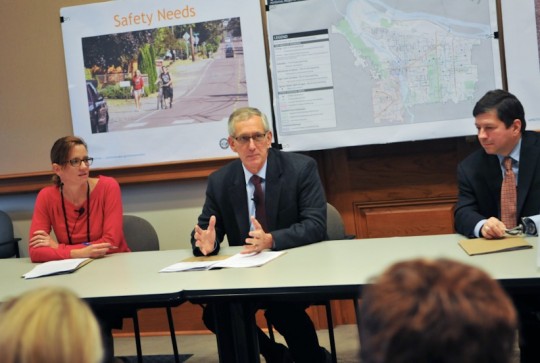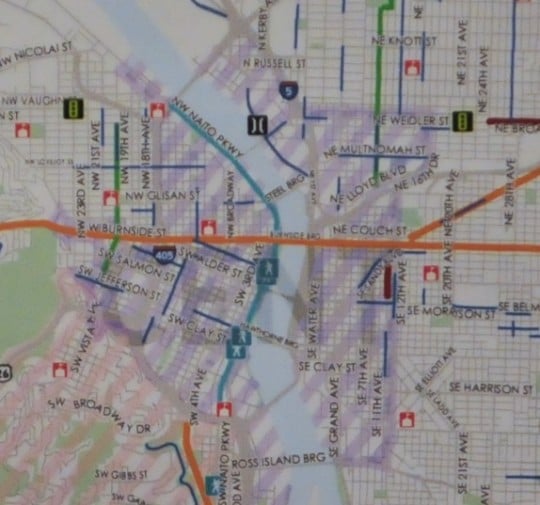
(Photo by J. Maus/BikePortland)
At City Hall this morning Mayor Charlie Hales, Transportation Commissioner Steve Novick and PBOT Director Leah Treat unveiled their latest proposal to raise new revenue for transportation. The “Portland Street Fund” would raise $46 million for maintenance and safety projects through a mix of business fees and personal income taxes.
The Street Fund strategy comes after their initial proposal back in May for a transportation user fee was met with a lot of criticism (especially from the business side of the equation). That idea would have slapped a flat fee on every household and would have charged businesses a fee based on a trip-generation algorithm.
Mayor Hales says the new proposal is “More humane and tolerable.” “No one likes taxes,” he said at this morning’s press conference, “But these are fair, reasonable, and bearable.”
Taxes from individuals will be based on income. Here’s a sample breakdown:
- A couple making $40,000 to $60,000 will pay $5 a month.
- A couple making $60,000 to $75,000 a year will pay $7.50 a month.
- A couple making $75,000 to $100,000 will pay $10 a month.
There’s also a $5,000 deduction available per child, so some people could move into a lower bracket after adjustments. And because this is a local income tax, the payments will be deductible on state and federal income tax forms.
Advertisement
PBOT Commissioner Novick said this proposal reflects his goal of protecting not just lower-income Portlanders but the middle-class as well. “We’re asking richer people to pay more in order to allow the middle-class to pay less.”
The new proposal also handles the business fee much differently than before. Instead of basing the businesses tax on real estate with a complicated trip-generation and land-use algorithm, the Street Fund will attach a new fee onto business licenses. The fees will be between $3 and $144 per month (with a 50% discount to non profits and an exemption for government agencies). The amount a business pays will be based on a combination of three factors: number of employees, square foot of business, and gross revenue.
Mayor Hales said the new business fee is “An elegant solution that’s easier to collect,” and one that will, “Spread the base of the tax across more taxpayers,” than the previous proposal. City documents shows that instead of billing 11,000 business accounts to raise $26 million, the new proposal will charge 120,000 accounts to raise $23 million.
As for what the revenue will be spent on, PBOT released an updated project list late last Friday. The Street Fund would allocate 54% of revenue to maintenance and 46% to safety. On the maintenance side, the largest investments will be made in residential and busy street paving with $44.4 million in the first three years — 42% of the total spending.
Sidewalks are the top priority on the safety side, with $9.6 million in projects slated to be completed in the first three years. 122nd Avenue would be the other big winner with $8 million in crossing, transit, and sidewalk improvement projects that would be split between years 1-3 and 4-6.
When it comes to bicycling-specific projects, the plan would fund a Central City protected bike lane network (east and west of the Willamette) to the tune of $3.2 million in the first three years. Other protected bike lane projects, like a new bridge over I-405 at Flanders, a new lane on NE Broadway from 24th to the bridge, and a host of new bikeways in southwest and east Portland, are slated to be funded in years 4-6.

There would also be $2.7 million invested in seven different neighborhood greenway projects in the first three years. Among the potential investments in the 4-6 year range is a new, $825,000 project that would “upgrade and enhance” some of Portland’s first bicycle boulevards like SE Clinton and NE Tillamook and bring them up to current neighborhood greenway standards.
Novick and Hales described their proposal as a balance between the needs of a “progressive coalition” (that included Oregon Walks, Coalition for a Livable Future, Bicycle Transportation Alliance, and others), and the Portland Business Alliance. Both of those interests were represented in advisory committees and Hales said the proposal is “A good hybrid of what both work groups wanted.”
Asked why they don’t plan to put this proposal to a public vote, Hales said that “We think this is a difficult decision that we were elected to make. This is the responsibility of government.” The mayor’s message to any would-be opponents is, “We can either do this, do something else, or do nothing.”
Next steps for the Portland Street Fund proposal is a first reading and public hearing on November 20th at 2:00 pm at City council chambers and a second reading and possible vote is scheduled for 10:00 am on December 3rd.
Learn more at OurStreetsPDX.com.




